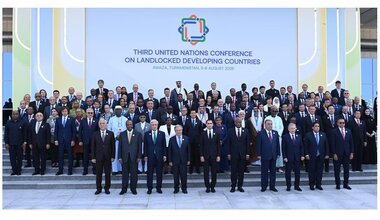SECRETARY-GENERAL’S MESSAGE ON WORLD FOOD DAY
New York, 16 October 2023
World Food Day 2023 comes during a global food crisis, with the world moving backwards on ending hunger and malnutrition.
Some 780 million people around the world are going hungry; almost fifty million children are at risk of death from severe wasting. Yet funding for this year’s global humanitarian appeal stands at just 32 percent.
In our world of plenty, it is outrageous that a person dies of hunger every few seconds, while the World Food Programme has been forced to cut its essential aid programmes.
In 2015, after years of progress, Governments set the goal of zero hunger by 2030.
But eight years later, the number of people suffering from hunger has increased significantly.
This crisis demands action – first and foremost from national governments, which have a responsibility to make sure their people have enough to eat.
But many governments lack the resources to do so, and so effective international solidarity is also essential.
The long-term causes of the global food crisis include conflicts, climate extremes, inequality, and economic instability.
The UN system is addressing these root causes through our support for sustainable, equitable food systems that put people over profits.
That means massively scaling up investments in resilient agriculture, and aligning them with climate action.
It means leveraging science and technology to improve the efficiency and reach of food systems.
This year’s theme for World Food Day focuses on water – a necessity for nutritious and healthy food.
The sustainable management of water for agriculture and food production is essential to end hunger, achieve the SDGs, and preserve water for future generations.
Zero hunger is achievable.
This World Food Day, I call on governments, the private sector, civil society and academia to work together;
to prioritize feeding the hungry;
to bring ending this crisis to the top of the global agenda;
and to invest in long-term solutions that provide everyone with enough to eat.
 UN
UN




